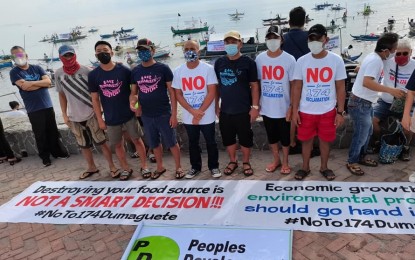
ANTI-RECLAMATION ORDINANCE. Coalition groups opposing a proposed multi-million pesos reclamation project in Dumaguete City, Negros Oriental are thankful to the Sangguniang Panlalawigan for enacting an ordinance protecting marine protected areas. Opposition groups, photographed here on Sept. 12, 2021, continue to hold protest activities in the capital city. (PNA file photo by Judy Flores Partlow)
DUMAGUETE CITY – A coalition of groups opposing the proposed controversial 174-hectare offshore reclamation project here is thankful to the Sangguniang Panlalawigan (SP) of Negros Oriental for its firm stand on the protection of marine protected areas (MPAs) to ensure food security.
“The coalition is pleased with the outcome of the voting (of the SP) to override the Governor’s (Roel Degamo) veto. We are thankful that all 12 board members present listened to the voice of the fisherfolks and voted in favor of ensuring the food security of the province,” said Gary Rosales, president of the environmental group Kahugpungan para sa Kinabuhi ug Kinaiyahan, Inc. (Kinaiyahan), in an interview Tuesday afternoon.
On Monday, the SP voted unanimously to override Degamo’s veto of proposed Ordinance No. 20 “establishing marine protected areas network in the province of Negros Oriental and declaring the marine protected areas that form the network as reclamation-free zones”.
Degamo, through Provincial Legal Officer Rogelio Enojo, in a video statement, said he vetoed the ordinance as it was “ultra vires” or beyond the powers of the local government, noting that the Office of the President has the sole authority to approve or disapprove reclamation projects.
But this does not change his stand opposing the proposed PHP23-billion offshore reclamation project here as everything remains unclear to him, Degamo said.
The coalition also thanked Degamo that while he vetoed the proposed ordinance for legal reasons, he did not recant his previous statement supporting the opposition groups, Rosales said.
“The coalition also thanks the governor for declaring publicly that he is against the proposed 174-hectare reclamation but our members were dismayed that he vetoed the provincial ordinance declaring existing and future MPAs as free from reclamation areas,” he said.
“However, he can make up for it by encouraging his allies in the municipalities and cities to pass ordinances creating MPAS in their respective jurisdictions (as) this would help ensure food security for the province and the region,” he added.
Vice Governor Edward Mark Macias said the measure on the protection of MPAs will have to be published three times in a weekly community paper before it officially becomes an ordinance.
In the proposed reclamation project in this capital dubbed "Smart City", at least four MPAs were identified, namely those in Barangays Banilad, Looc, Mangnao, and Bantayan.
The “father of MPAs”, National Scientist Dr. Angel C. Alcala, who hails from this city, is among those opposed to the project.
Mayor Felipe Antonio Remollo has repeatedly said the project will be “at no cost” to the city government and is seen to boost the economy and generate jobs and livelihood.
Remollo has asked the city council to withdraw the resolution granting him authority to enter into a memorandum of understanding with Quezon City-based proponent, E.M. Cuerpo, Inc., which opposition groups learned had partnered with Chinese firm Poly Changda Engineering Ltd. Co. Inc.
Opposition groups have been mounting protest activities for more than two months now against the reclamation project, citing legal, moral, and environmental reasons, among others. (PNA)
